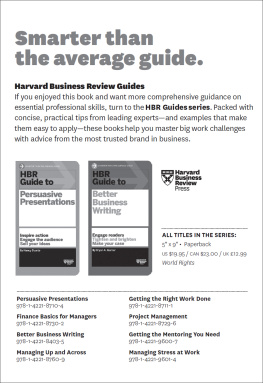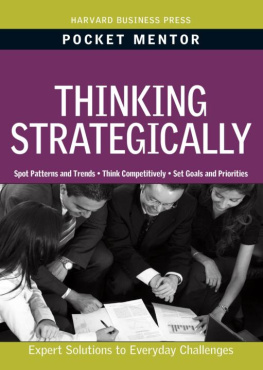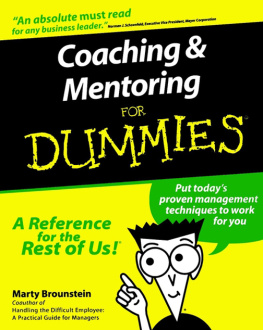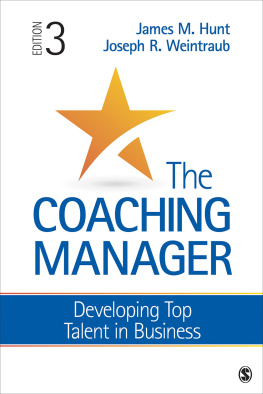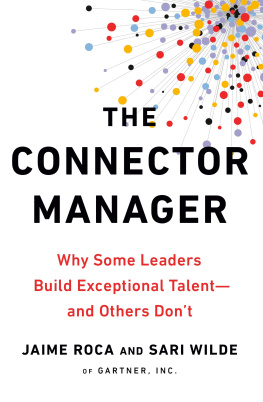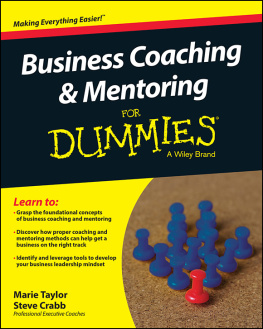Arm yourself with the advice you need to succeed on the job, from the most trusted brand in business. Packed with how-to essentials from leading experts, the HBR Guides provide smart answers to your most pressing work challenges.
HBR Guide to
Coaching Employees
HARVARD BUSINESS REVIEW PRESS
Boston, Massachusetts
HBR Press Quantity Sales Discounts
Harvard Business Review Press titles are available at significant quantity discounts when purchased in bulk for client gifts, sales promotions, and premiums. Special editions, including books with corporate logos, customized covers, and letters from the company or CEO printed in the front matter, as well as excerpts of existing books, can also be created in large quantities for special needs.
For details and discount information for both print and ebook formats, contact
Copyright 2015 Harvard Business School Publishing Corporation
All rights reserved
Printed in the United States of America
10 9 8 7 6 5 4 3 2 1
No part of this publication may be reproduced, stored in or introduced into a retrieval system, or transmitted, in any form, or by any means (electronic, mechanical, photocopying, recording, or otherwise), without the prior permission of the publisher. Requests for permission should be directed to , or mailed to Permissions, Harvard Business School Publishing, 60 Harvard Way, Boston, Massachusetts 02163.
The web addresses referenced in this book were live and correct at the time of the books publication but may be subject to change.
Library-of-Congress cataloging information forthcoming
ISBN: 978-1-62527-533-2
eISBN: 978-1-62527-538-7
The paper used in this publication meets the requirements of the American National Standard for Permanence of Paper for Publications and Documents in Libraries and Archives Z39.48-1992.
What Youll Learn
When youre swamped with work, its hard to make time to coach your employeesand do it well. But if you dont help them build their skills, theyll keep coming to you for answers instead of finding their own solutions. That kind of hand-holding kills productivity and creativity, and you cant sustain it. In the long run, it eats up a lot more time and energy than investing in peoples development.
So you really must coach to be an effective manager. Got a star on your team whos eager to advance? An under performer whos dragging the group down? A steady contributor who feels bored and neglected? With all of them, youll need to agree on goals for growth, motivate them to achieve those goals, support their efforts, and measure their progress. This guide gives you the tools to do that.
Youll get better at:
- Asking the right questions before you dispense advice
- Creating realistic but inspiring plans for growth What Youll Learn
- Providing the support employees need to achieve peak performance
- Tapping their learning styles to make greater progress
- Giving them feedback theyll actually apply
- Giving them room to grapple with problems and discover solutions
- Engaging your employees and fostering independence
- Matching peoples skills with your organizations needs
- Customizing your approach
Contents
Coaching is leading.
BY ED BATISTA
Youre learning right along with your employees.
BY CANDICE FRANKOVELGIA
A practical, concrete plan for achieving peak performance.
BY EDWARD M. HALLOWELL, MD
Build rapport so that they can hear your feedback.
BY JIM DOUGHERTY
Ask questions, articulate goals, reframe challenges.
BY AMY JEN SU
Monitor and adjust.
BY PAM KRULITZ AND NINA BOWMAN
Prevent a fight-or-flight response.
BY ED BATISTA
Tap the deep smarts of your subject-matter experts.
BY DOROTHY LEONARD AND WALTER SWAP
Adopt efficient habits and claim found time.
BY DAISY WADEMAN DOWLING
Theyll continue to grow through self-coaching.
BY ED BATISTA
Pitfalls to watch out forand how to remedy them.
BY MURIEL MAIGNAN WILKINS
Find approaches to learning that your employees will be motivated to follow.
BY DAVID A. KOLB AND KAY PETERSON
You cantand shouldntgive them equal time.
BY JIM GRINNELL
Help them avoid classic beginners errors.
BY CAROL A. WALKER
Dont promote people before theyre ready.
BY KERRY A. BUNKER, KATHY E. KRAM, AND SHARON TING
When to interveneand how.
BY J. RICHARD HACKMAN
Introduction: Why Coach?
by Ed Batista
After graduating from business school, I was hired by a founding board of directors to launch a new organization, the Nonprofit Technology Enterprise Network. I had shared a leadership position before, but this was my first time as a solo chief executive, and I believed it was my responsibility to come up with the best ideas myself and champion them aggressively.
This approach led to a number of conflicts with my directors. A mentor of mine on the board took me aside and said, We think youre a talented young guy, but you have some rough edges. Wed like you to invest in yourself and get a coach. One of my former professors had a coaching practice, and I asked her to take me on as a client. That was one of the best things Ive ever done.
Although few coaching clients ultimately decide to become coaches, as I did, my positive experience of coaching is typical. The tremendous growth in the field over the past 20 years has been driven by consistent reports from clients who feel more effective and fulfilled as a result of the coaching theyve received. And it doesnt help only at the individual level. Although researchers cant yet precisely measure coachings effect on organizational performance, numerous studies (published in the Journal of Management, Consulting Psychology Journal, and other publications) show a positive impact.
Being coached helped me understand that I could make the biggest difference as a leader not by doing more than everyone else but by empowering other people to do more and motivating them to do their best. This meant letting go of certain responsibilities and recognizing the limits of my expertise. I didnt need to have all the answers; I just needed to ask the right questions. In short, I came to realize that effective leadership looks a lot like coaching.
But what do we mean by coaching in the first place? The simplest definition is asking questions that help people discover the answers that are right for them. A more specific definition that applies to you as a leader and manager is a style of management primarily characterized by asking employees questions in order to help them fulfill their immediate responsibilities more effectively and advance their development as professionals over time. The emphasis on


